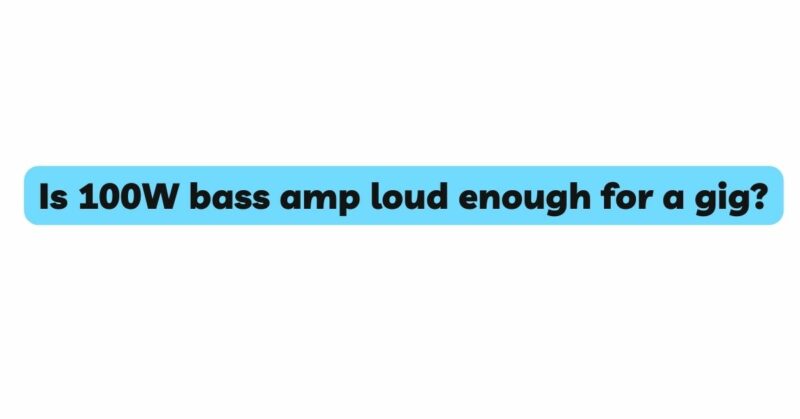When the stage is set and the audience is eagerly waiting, the power of your bass amp becomes paramount to delivering a sonic experience that resonates. The question that often arises is whether a 100-watt bass amp is robust enough to command a gigging stage. The answer isn’t as simple as the wattage number itself—it involves a symphony of considerations, including venue size, playing style, amplifier efficiency, and the intricacies of low-frequency sound. This article dives deep into the world of bass amplification, dissecting the potential of a 100-watt bass amp for live performances and uncovering the factors that dictate whether it’s a powerful choice for your musical journey.
Understanding Amplifier Wattage: Wattage measures the power an amplifier can deliver to your speakers, influencing both the volume and clarity of your sound. In theory, a 100-watt bass amp would appear to pack a punch. However, the perceived loudness isn’t a direct linear relationship with wattage; it’s affected by various variables in the signal chain and the complex nature of bass frequencies.
Venue Size and Acoustic Challenges: The size of the venue is a paramount factor in determining whether a 100-watt bass amp can effectively reach the audience. In smaller venues, such as clubs or intimate settings, a 100-watt amp can often deliver ample volume without overpowering the space. However, in larger venues or outdoor performances, the sound must carry farther, demanding more power to achieve the desired impact.
The Low-Frequency Challenge: Bass frequencies, being longer and having greater energy, require more power to project effectively compared to higher frequencies. This means that bass amps need more wattage to deliver the same perceived volume as amps used for midrange or treble instruments. Therefore, a 100-watt bass amp might not translate to the same volume level as a 100-watt guitar amp due to the unique demands of bass frequencies.
Headroom and Clean Sound: Headroom is the ability of an amplifier to handle dynamic peaks without distorting. For bassists who desire a clean, undistorted sound even at higher volumes, a 100-watt bass amp can provide the headroom necessary to maintain sonic integrity. This is particularly important when your playing style involves dynamic shifts and complex basslines.
Amplifier Design and Efficiency: Different amplifier classes (e.g., Class A, Class AB, Class D) offer varying efficiency and tonal characteristics. Class D amplifiers are known for their high efficiency and are commonly used in bass amps. They can provide more sound output per watt, making a 100-watt Class D bass amp quite capable of delivering a powerful performance.
Playing Style and Genre: The style of music you play greatly influences your amplifier requirements. If your genre involves intricate basslines, slapping, or fingerstyle playing, a 100-watt bass amp can be an effective tool to ensure that your nuances are heard clearly in a live setting. On the other hand, genres that prioritize deep bass and sustained notes might benefit from an amplifier with even higher wattage.
Band Dynamics and Volume Balance: The configuration of your band and the volume balance between instruments play a crucial role. If your band includes drums, guitars, vocals, and possibly keyboards, the bass needs to cut through the mix without overpowering other elements. A 100-watt bass amp can often provide the balance needed for a cohesive performance.
Sound Reinforcement and Mic’ing: In many live performance scenarios, bass amps are mic’d and integrated into the venue’s sound reinforcement system. This means that the 100-watt amp’s output is combined with the venue’s speakers to ensure an even distribution of sound. As a result, a 100-watt bass amp can effectively contribute to the overall sound without needing to solely rely on its wattage.
Balancing Wattage and Portability: While higher wattages can offer more volume and headroom, portability is also a key consideration. Carrying around a massive bass amp can be a logistical challenge, especially if you’re navigating through tight spaces or loading equipment into a vehicle. A 100-watt bass amp strikes a balance between power and portability, making it a versatile choice for many gigging scenarios.
Practical Sound Checks: Before a gig, conducting thorough sound checks in the actual venue helps you fine-tune your bass amp’s settings to suit the acoustics of the space. This ensures that you’re maximizing the potential of your 100-watt bass amp and delivering an optimal performance.
Conclusion: The suitability of a 100-watt bass amp for gigging hinges on a blend of venue size, playing style, genre, amplifier design, and personal preferences. While it may not be the definitive solution for every gigging situation, a 100-watt bass amp offers a balance of power, headroom, and portability that can make it a formidable choice for many bassists. By understanding the complexities of low-frequency projection, amplifier efficiency, and the demands of your musical style, you can harness the potential of your 100-watt bass amp to deliver a performance that reverberates with both you and your audience.


